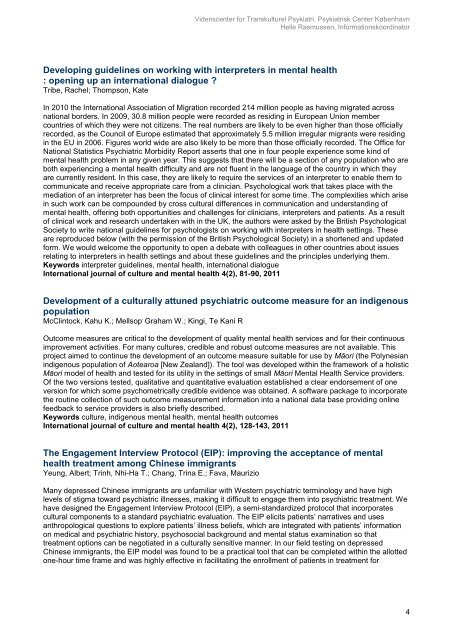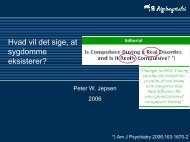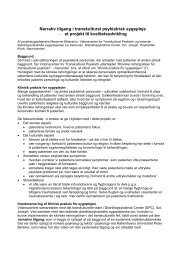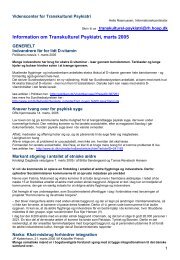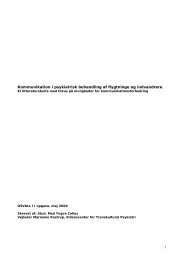Information om Transkulturel Psykiatri, marts 2009 - Videnscenter for ...
Information om Transkulturel Psykiatri, marts 2009 - Videnscenter for ...
Information om Transkulturel Psykiatri, marts 2009 - Videnscenter for ...
You also want an ePaper? Increase the reach of your titles
YUMPU automatically turns print PDFs into web optimized ePapers that Google loves.
<strong>Videnscenter</strong> <strong>for</strong> <strong>Transkulturel</strong> <strong>Psykiatri</strong>. <strong>Psykiatri</strong>sk Center København<br />
Helle Rasmussen, <strong>In<strong>for</strong>mation</strong>skoordinator<br />
Developing guidelines on working with interpreters in mental health<br />
: opening up an international dialogue ?<br />
Tribe, Rachel; Th<strong>om</strong>pson, Kate<br />
In 2010 the International Association of Migration recorded 214 million people as having migrated across<br />
national borders. In <strong>2009</strong>, 30.8 million people were recorded as residing in European Union member<br />
countries of which they were not citizens. The real numbers are likely to be even higher than those officially<br />
recorded, as the Council of Europe estimated that approximately 5.5 million irregular migrants were residing<br />
in the EU in 2006. Figures world wide are also likely to be more than those officially recorded. The Office <strong>for</strong><br />
National Statistics Psychiatric Morbidity Report asserts that one in four people experience s<strong>om</strong>e kind of<br />
mental health problem in any given year. This suggests that there will be a section of any population who are<br />
both experiencing a mental health difficulty and are not fluent in the language of the country in which they<br />
are currently resident. In this case, they are likely to require the services of an interpreter to enable them to<br />
c<strong>om</strong>municate and receive appropriate care fr<strong>om</strong> a clinician. Psychological work that takes place with the<br />
mediation of an interpreter has been the focus of clinical interest <strong>for</strong> s<strong>om</strong>e time. The c<strong>om</strong>plexities which arise<br />
in such work can be c<strong>om</strong>pounded by cross cultural differences in c<strong>om</strong>munication and understanding of<br />
mental health, offering both opportunities and challenges <strong>for</strong> clinicians, interpreters and patients. As a result<br />
of clinical work and research undertaken with in the UK, the authors were asked by the British Psychological<br />
Society to write national guidelines <strong>for</strong> psychologists on working with interpreters in health settings. These<br />
are reproduced below (with the permission of the British Psychological Society) in a shortened and updated<br />
<strong>for</strong>m. We would welc<strong>om</strong>e the opportunity to open a debate with colleagues in other countries about issues<br />
relating to interpreters in health settings and about these guidelines and the principles underlying them.<br />
Keywords interpreter guidelines, mental health, international dialogue<br />
International journal of culture and mental health 4(2), 81-90, 2011<br />
Development of a culturally attuned psychiatric outc<strong>om</strong>e measure <strong>for</strong> an indigenous<br />
population<br />
McClintock, Kahu K.; Mellsop , Graham W.; Kingi, Te Kani R<br />
Outc<strong>om</strong>e measures are critical to the development of quality mental health services and <strong>for</strong> their continuous<br />
improvement activities. For many cultures, credible and robust outc<strong>om</strong>e measures are not available. This<br />
project aimed to continue the development of an outc<strong>om</strong>e measure suitable <strong>for</strong> use by Māori (the Polynesian<br />
indigenous population of Aotearoa [New Zealand]). The tool was developed within the framework of a holistic<br />
Māori model of health and tested <strong>for</strong> its utility in the settings of small Māori Mental Health Service providers.<br />
Of the two versions tested, qualitative and quantitative evaluation established a clear endorsement of one<br />
version <strong>for</strong> which s<strong>om</strong>e psych<strong>om</strong>etrically credible evidence was obtained. A software package to incorporate<br />
the routine collection of such outc<strong>om</strong>e measurement in<strong>for</strong>mation into a national data base providing online<br />
feedback to service providers is also briefly described.<br />
Keywords culture, indigenous mental health, mental health outc<strong>om</strong>es<br />
International journal of culture and mental health 4(2), 128-143, 2011<br />
The Engagement Interview Protocol (EIP): improving the acceptance of mental<br />
health treatment among Chinese immigrants<br />
Yeung, Albert; Trinh, Nhi-Ha T.; Chang, Trina E.; Fava, Maurizio<br />
Many depressed Chinese immigrants are unfamiliar with Western psychiatric terminology and have high<br />
levels of stigma toward psychiatric illnesses, making it difficult to engage them into psychiatric treatment. We<br />
have designed the Engagement Interview Protocol (EIP), a semi-standardized protocol that incorporates<br />
cultural c<strong>om</strong>ponents to a standard psychiatric evaluation. The EIP elicits patients‘ narratives and uses<br />
anthropological questions to explore patients‘ illness beliefs, which are integrated with patients‘ in<strong>for</strong>mation<br />
on medical and psychiatric history, psychosocial background and mental status examination so that<br />
treatment options can be negotiated in a culturally sensitive manner. In our field testing on depressed<br />
Chinese immigrants, the EIP model was found to be a practical tool that can be c<strong>om</strong>pleted within the allotted<br />
one-hour time frame and was highly effective in facilitating the enrollment of patients in treatment <strong>for</strong><br />
4


